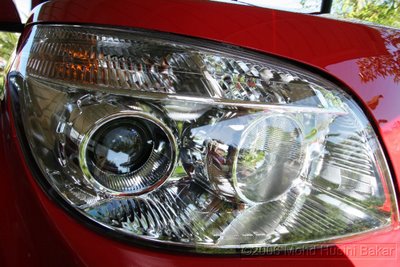
Vision for the future
By Azlan Othman
Cataract, which is the number one cause of blindness in Asean countries, is almost eradicated in Brunei Darussalam. This is the result of the continuous effort of His Majesty's Government through the Ministry of Health, which has made cataract surgery very accessible and affordable.
The Minister of Health, Pehin Dato Hj Suyoi, who was speaking during the launching of World Sight Day at RIPAS Hospital yesterday, said that the main cause of blindness in the Sultanate is diabetic retinopathy.
From diabetic screenings conducted by the Eye Department from 1997 to 2000, it is estimated that one in 37 Bruneians would be diabetic in 2006, the minister said.
Of that number, one in five diabetic patients will have some form of diabetic retinopathy and visual impairment, while one in 25 will be blinded from the condition, Pehin Hj Suyoi added.
Fortunately, diabetic retinopathy can be prevented.
On average, it takes nine years for a diabetic patient to develop diabetic retinopathy, and 15 years before a diabetic person is affected visually, the Minister of Health said, adding that these findings stress the importance of diabetic retinopathy screening.
Meanwhile, Pehin Hj Suyoi lauded the initiative by the Department of Ophthalmology in conducting twice-weekly diabetic screening programmes in all hospitals in Brunei.
"I encourage members of the public to utilise these services as they have shown to be successful in the management of the most important cause of blindness in Brunei," he said.
Earlier, the minister said Brunei like many other countries in the world commemorates the global effort to prevent avoidable blindness by 2020.World Sight Day is truly a global event, which is aimed at increasing the profile of Vision 2020: The Right to Sight.
Almost 90 per cent of all World Health Organisation (WHO) member countries have organised prevention of blindness activities in their respective countries, which highlight the global recognition of blindness as an important public health issue.
According to studies conducted by WHO in 2002, 161 million people globally are visually impaired: 37 million are blind and 124 million suffering from poor vision.
It is estimated that every five seconds, one person in the world goes blind. One child goes blind every minute and seven million people become blind each year.
But more importantly, 80 per cent of cases are avoidable, either resulting from preventable conditions (20 per cent) or being treated (60 per cent) so that the sight is restored.
Meanwhile, the chairman of the committee, Mr Nayan Joshi, who is also the Head of Ophthalmology Department, said high quality and up-to-date cataract surgeries are available to all in the Sultanate.
There are well-established nationwide screening programmes to address the problem of chronic non-communicable diseases i.e. glaucoma, diabetic eye disease and childhood blindness, he said.
"In the following years, there are plans to augment these screening programmes by launching compulsory 'Nation Screening Programmes' for diabetic retinopathy and glaucoma," Mr Joshi said, adding that there would also be programmes for schools.
"These will be further supported by Telemetric Remote Screening and Mobile Screening Units. Proposals have been made to reduce amblyopia and childhood blindness by the provision of subsidised corrective glasses to children," he said.

No comments:
Post a Comment